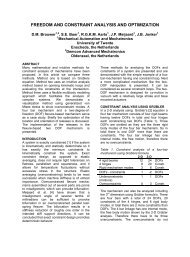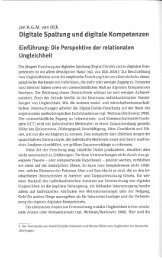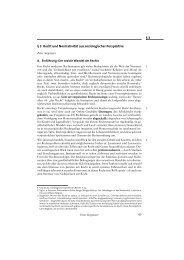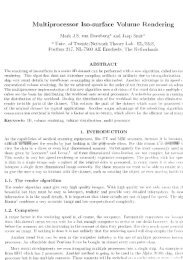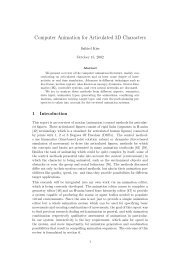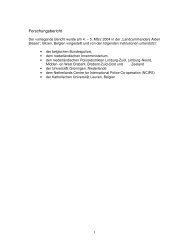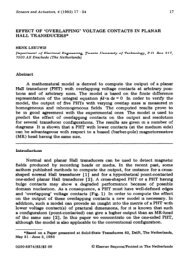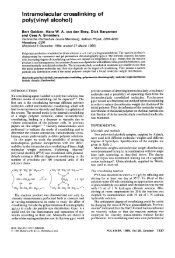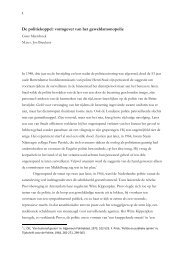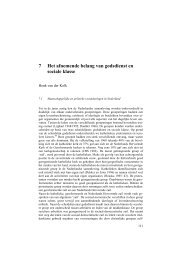Innovation and institutional change: the transition to a sustainable ...
Innovation and institutional change: the transition to a sustainable ...
Innovation and institutional change: the transition to a sustainable ...
You also want an ePaper? Increase the reach of your titles
YUMPU automatically turns print PDFs into web optimized ePapers that Google loves.
Theoretical perspectives 55<br />
technologies are complex, <strong>the</strong>y require complex networks that create,<br />
acquire, <strong>and</strong> integrate <strong>the</strong> diverse knowledge <strong>and</strong> skills involved in <strong>the</strong><br />
innovation. In a similar vein Teece (1992) argues that advanced<br />
technological systems are not created in isolation, but require building<br />
linkages for joint production of knowledge both along <strong>the</strong> supply chain, in<br />
collaboration with knowledge organisations, <strong>and</strong> with a range of ac<strong>to</strong>rs in<br />
order <strong>to</strong> develop or adapt st<strong>and</strong>ards <strong>and</strong> regulations, for example industrial<br />
st<strong>and</strong>ards, safety regulations, etc. Van Rossum (2000) also argues that <strong>the</strong><br />
structures of network-based industries such as electricity, transport <strong>and</strong><br />
telecommunications, impact innovative processes in <strong>the</strong>se industries. He<br />
points at <strong>the</strong> pervasiveness of path-dependent network externalities.<br />
<strong>Innovation</strong> networks in <strong>the</strong> electricity system are <strong>the</strong>n strongly conditioned<br />
by <strong>the</strong> st<strong>and</strong>ards prescribed by <strong>the</strong> transmission network <strong>and</strong> its mode of<br />
provision.<br />
The network perspective is a key element in <strong>the</strong> approach of environmental<br />
management, as in a system of more sophisticated environmental<br />
management <strong>the</strong> firm needs <strong>to</strong> connect with a variety of stakeholders<br />
(Roome, 1998). The focus on networks is also present in research on<br />
industrial ecology <strong>and</strong> product chains. Networks, such as in industrial<br />
ecology, are deemed crucial <strong>to</strong> advance <strong>to</strong>wards sustainability as <strong>the</strong>y are<br />
able <strong>to</strong> provide adaptability (e.g. continuous rethinking of goals, strategies<br />
<strong>and</strong> implementation), diversity as a learning potential (as <strong>the</strong> presence of<br />
multiple perspectives increases <strong>the</strong> likelihood of higher order learning <strong>to</strong><br />
occur), <strong>and</strong> enable <strong>the</strong> ex<strong>change</strong> of tacit knowledge. One focus is on <strong>the</strong><br />
organisational mode of networks <strong>and</strong> its relation <strong>to</strong> <strong>the</strong> type of innovation<br />
that is likely <strong>to</strong> be generated. Loose coupling within networks promotes<br />
radical innovation through its diversity <strong>and</strong> adaptability, but is less<br />
conducive for <strong>the</strong> ex<strong>change</strong> of tacit knowledge necessary <strong>to</strong> realise its<br />
learning potential while tight coupling is more conducive for <strong>the</strong> ex<strong>change</strong> of<br />
tacit knowledge but favours incrementalism (Boons <strong>and</strong> Berends, 2001).<br />
While <strong>the</strong> previous research focuses mainly on processes internal <strong>to</strong> <strong>the</strong> firm<br />
<strong>and</strong> its networks, in Boons et al. (2000) <strong>the</strong>re is more explicit focus on <strong>the</strong><br />
interaction between external <strong>and</strong> internal fac<strong>to</strong>rs <strong>and</strong> processes <strong>and</strong> how this<br />
has shaped <strong>the</strong> greening of business practices in <strong>the</strong> Ne<strong>the</strong>rl<strong>and</strong>s. Some of<br />
<strong>the</strong> ‘new’ organisational routines that are studied are <strong>the</strong> product-oriented<br />
approach <strong>to</strong> environmental problems (e.g. eco-design), <strong>the</strong> preventionoriented<br />
approach (pollution prevention <strong>and</strong> cleaner production), <strong>and</strong> <strong>the</strong><br />
management-oriented approach (e.g. environmental management systems).<br />
They conclude that although <strong>the</strong>se routines have <strong>to</strong> some extent become part<br />
of <strong>the</strong> operational <strong>and</strong> management activities of companies, this has<br />
generally not resulted in fundamental <strong>change</strong>s such as radically new<br />
technologies, products, or designs. They tentatively explain this by <strong>the</strong> fact



